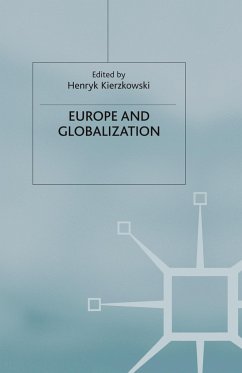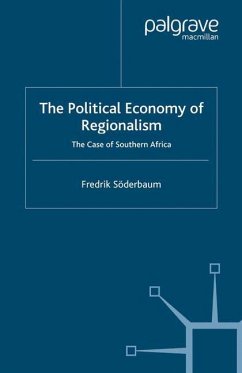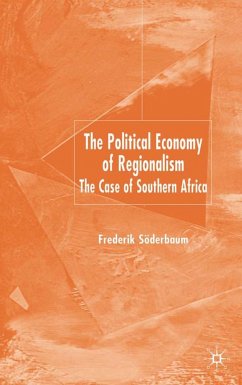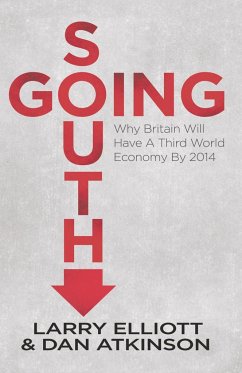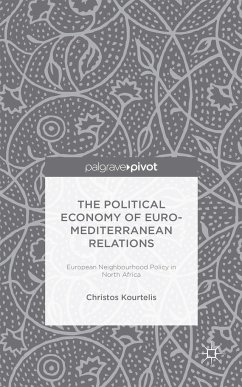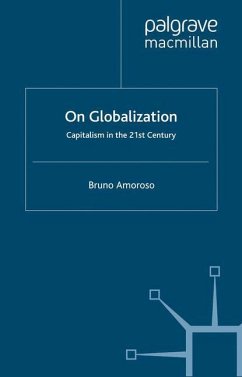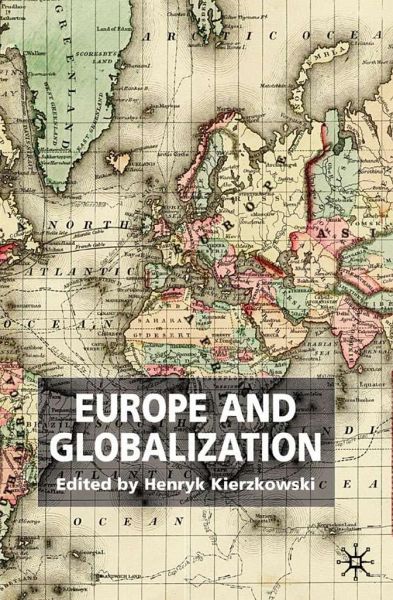
Henryk Kierzkowski
Gebundenes Buch
Europe and Globalization
Versandkostenfrei!
Versandfertig in 6-10 Tagen
Weitere Ausgaben:

PAYBACK Punkte
19 °P sammeln!





Globalization has provoked passionate debate and street demonstrations reminiscent of May 1968. The central question of Europe and Globalization is 'what did Europe do for globalization in the past, and what is globalization doing for Europe today?' The contributors to the volume assess this complex process, and Europe's role within it. Bringing together a team of leading international scholars from different disciplinary backgrounds, this is a valuable and wide-ranging contribution to the debate.
VINOD K. AGGARWAL Professor, Department of Political Science, University of California, Berkeley SIR TONY ATKINSON Warden, Nuffield College, Oxford FRANK BARRY Lecturer in Economics, University College, Dublin ALBERT BRETON Professor of Economics, University of Toronto JOHN CANTWELL Professor of International Economics, University of Reading CÉDRIC DUPONT Associate Professor of Political Science, Graduate Institute of International Studies, Geneva RONALD FINDLAY Professor of Economics, Columbia University, New York MARCELO G. KOHEN Associate Professor of International Law, Graduate Institute of International Studies, Geneva ANDRÉ LIEBICH Professor of International History and Politics, Graduate Institute of International Studies, Geneva KEVIN HJORTSHØJ O'ROURKE Professor of Economics, Trinity College, Dublin LUCIA PISCITELLO Associate Professor in Industrial Economics and Management, Politecnico di Milano FRANCES RUANE Associate Professor of Economics, Trinity College, Dublin XAVIER SALA-I-MARTIN Professor of Economics, Columbia University, New York ALFRED STEINHERR Vice-Chancellor and Professor of Economics, Free University of Bozen-Bolzano, Italy JULIE SUTHERLAND Lecturer in Economics, University of Wollongong DAVID SYLVAN Professor of International Relations, Graduate Institute of International Studies, Geneva HEINRICH URSPRUNG Research Fellow, CESSifo, Munich
Produktdetails
- Verlag: Palgrave Macmillan / Palgrave Macmillan UK / Springer Palgrave Macmillan
- Artikelnr. des Verlages: 978-0-333-99839-7
- 2002 edition
- Seitenzahl: 332
- Erscheinungstermin: 14. Juni 2002
- Englisch
- Abmessung: 229mm x 173mm x 26mm
- Gewicht: 523g
- ISBN-13: 9780333998397
- ISBN-10: 0333998391
- Artikelnr.: 21862981
Herstellerkennzeichnung
Libri GmbH
Europaallee 1
36244 Bad Hersfeld
gpsr@libri.de
I very much welcome this book which presents an interesting and multi-faceted view of globalization and of how Europe interacts with it. Globalisation can indeed bring many opportunities but it can also generate deep social inequalities. On the other hand, the European Union has managed to increase prosperity while developing cohesion and social inclusiveness. The EU therefore appears as a successful example - on a smaller scale - of what a more 'balanced' globalisation could be. I am convinced that Europe can benefit from globalisation and that globalisation can benefit from Europe.' - Romano Prodi, President, European Commission
Max Weber once said that Europe was the mistress of the world and this book can be thought of as an
Max Weber once said that Europe was the mistress of the world and this book can be thought of as an
Mehr anzeigen
analysis of the world's reaction. It is indeed an intellectual feast, full of new perspectives, deep in historical allusions, and rich in economic, political and sociological analysis. Its subject covers with a broad sweep what is arguably the most contentious issue of our times and it spectacularly breaks new ground.' - Robert A. Mundell, 1999 Nobel Prize in Economic, Professor of Economics, Columbia University, New York
This collection of essays is timely as we move into the next phase of European development - as Europe continues to integrate more closely and as it defines a new role for itself in the globalization process. This new phase raises new legal, economic and political challenges. The range and diversity of the contributions in this book are a testimony to the complex phenomenon that we call globalization and the authors, leading scholars in their fields, raise some provocative issues which are worthy of our serious consideration.' - Peter D. Sutherland, Chairman BP plc, Chairman and Managing Director, Goldman Sachs International, European Chairman of the Trilateral Commision, Former Director General of GATT/WTO
Europe represents a small fraction of the globe's land mass, but has over centuries been key to the many facets of globalization. This volume brings together experts in economics, history, political science and international law to discuss the importance of the European role in the current version of pressures for and from globalization. It is a two-way street, with many ancillary alleys and lanes. A fascinating study.' - Ronald W. Jones, Professor of Economics, University of Rochester
This remarkable collection may be the most thought-provoking book yet on the causes and consequences of globalization. The authors' historical perspectives train new light on the internationalization of transactions and on the implications of that process for the organization of European economy and society. Their mature scholarship moves beyond facile comparisons with earlier periods of internationalization to lay bare what is distinctive about our age. It will repay study by those who care about the reality and not merely the rhetoric of globalization.' - Barry Eichengreen, Professorof Economics and Political Science, University of California, Berkeley
Has globalization really increased income inequality? How new is globalization, and what roles have Islam and Europe played in growing globalization over the centuries? These and many other issues are discussed in this profoundly scholarly and highly relevant book. People who write about globalization, who demonstrate against it or just worry about it, and who really wish to understand it in its historical context, should read and study this book.' - W. Max Corden, Professor of Economics, SAIS, Johns Hopkins University, Washington, D.C.
'This remarkable collection may be the most thought-provoking book yet on the causes and consequences of globalization. The authors' historical perspectives train new light on the internationalization of transactions and on the implications of that process for the organization of European economy and society. Their mature scholarship mo
'... an interesting volume, with an interesting spread of contributions.' - Alison M. S. Watson, European Foreign Affairs Review.
This collection of essays is timely as we move into the next phase of European development - as Europe continues to integrate more closely and as it defines a new role for itself in the globalization process. This new phase raises new legal, economic and political challenges. The range and diversity of the contributions in this book are a testimony to the complex phenomenon that we call globalization and the authors, leading scholars in their fields, raise some provocative issues which are worthy of our serious consideration.' - Peter D. Sutherland, Chairman BP plc, Chairman and Managing Director, Goldman Sachs International, European Chairman of the Trilateral Commision, Former Director General of GATT/WTO
Europe represents a small fraction of the globe's land mass, but has over centuries been key to the many facets of globalization. This volume brings together experts in economics, history, political science and international law to discuss the importance of the European role in the current version of pressures for and from globalization. It is a two-way street, with many ancillary alleys and lanes. A fascinating study.' - Ronald W. Jones, Professor of Economics, University of Rochester
This remarkable collection may be the most thought-provoking book yet on the causes and consequences of globalization. The authors' historical perspectives train new light on the internationalization of transactions and on the implications of that process for the organization of European economy and society. Their mature scholarship moves beyond facile comparisons with earlier periods of internationalization to lay bare what is distinctive about our age. It will repay study by those who care about the reality and not merely the rhetoric of globalization.' - Barry Eichengreen, Professorof Economics and Political Science, University of California, Berkeley
Has globalization really increased income inequality? How new is globalization, and what roles have Islam and Europe played in growing globalization over the centuries? These and many other issues are discussed in this profoundly scholarly and highly relevant book. People who write about globalization, who demonstrate against it or just worry about it, and who really wish to understand it in its historical context, should read and study this book.' - W. Max Corden, Professor of Economics, SAIS, Johns Hopkins University, Washington, D.C.
'This remarkable collection may be the most thought-provoking book yet on the causes and consequences of globalization. The authors' historical perspectives train new light on the internationalization of transactions and on the implications of that process for the organization of European economy and society. Their mature scholarship mo
'... an interesting volume, with an interesting spread of contributions.' - Alison M. S. Watson, European Foreign Affairs Review.
Schließen
Für dieses Produkt wurde noch keine Bewertung abgegeben. Wir würden uns sehr freuen, wenn du die erste Bewertung schreibst!
Eine Bewertung schreiben
Eine Bewertung schreiben
Andere Kunden interessierten sich für


